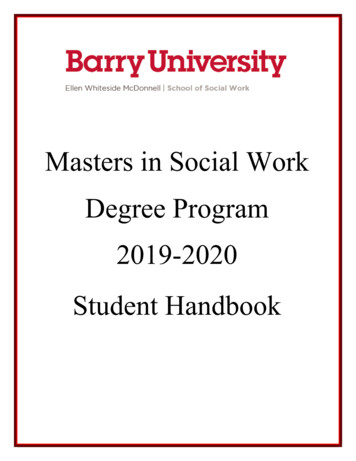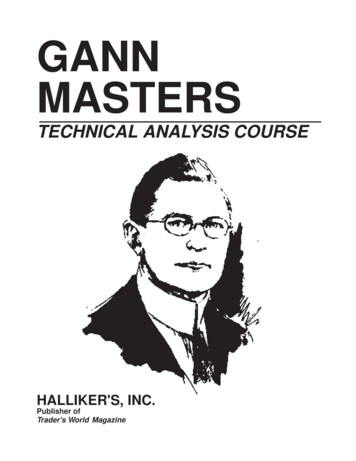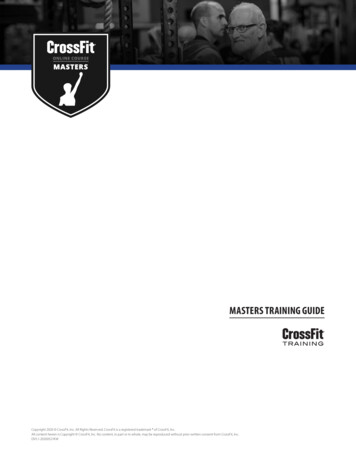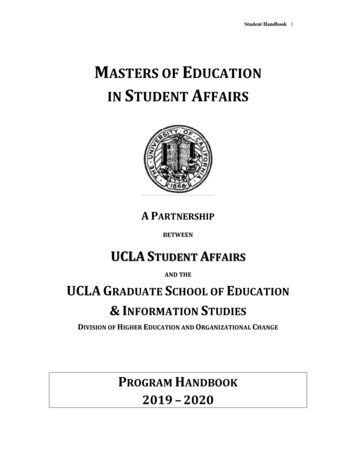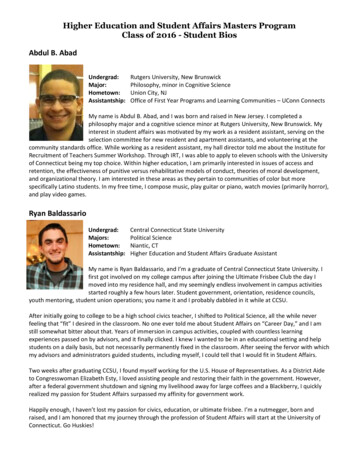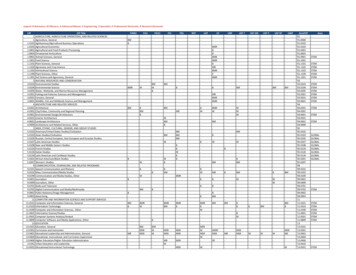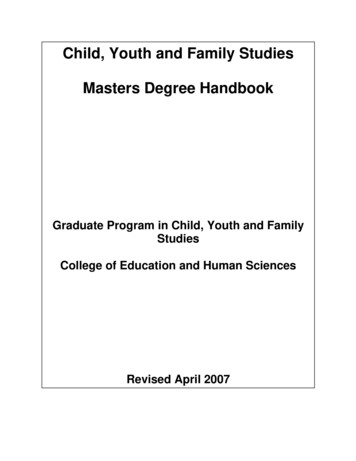
Transcription
Child, Youth and Family StudiesMasters Degree HandbookGraduate Program in Child, Youth and FamilyStudiesCollege of Education and Human SciencesRevised April 2007
Table of ContentsCYAF Masters’ Degree Handbook Overview5Overview of Masters Degree Program5The University of Nebraska6About Lincoln6Child, Youth and Family Studies Masters’ Program7Departmental Facilities9Employment Possibilities10Admission and Completion Policies11Admission DeadlinesGeneral InformationAdmission Categories131314Appeals for Denial into the Masters Program14Welcome to Department of Child, Youth and Family Studies17Assignment of a Mentor/AdvisorFirst Steps After AdmissionsResidency and Time Requirements for “in Residence” ProgramsTime Limit for ProgramTransfer CreditsUnclassified CreditBuilding a CommitteeMaster Degree Options I, II and IIIMemorandum of CoursesStandards of QualityMinor in Child, Youth and Family StudiesThesis/Scholarly Practice and DiscoveryDepartment Seminar to Share Thesis/Scholarly Discovery ProjectsThesis GuidelinesQualitative ResearchOverview of the Qualitative Research Design ProcedureQualitative Research ProcessProposal OutlineQualitative Thesis 4262728302
Thesis Sample Title PageGraduate College Guidebook for Preparing ThesisOral ExaminationCelebration after the oral ExaminationTime LineMasters Degree Deadline DatesGraduate Program Time Line ChartRequest for Change of Mentor/AdvisorSeeking Assistance When Things Go AwryStudent ResponsibilitiesFinancial AssistanceTuition RemissionScholastic Grade RequirementsAppeal of GradesProbation and TerminationCore Requirements for Child, Youth and Family Studies M.S. Program31323232333334353535353536363738CYAF Graduate Program Tracks, Specializations and CertificatesChild Development/Early Childhood Education Track40Family and Consumer Sciences Education Track42Family and Consumer Sciences Eduation On-Line Great Plains IDEA Program47Family Financial Planning Specialization & Certificate49Family Science Track52Marriage and Family Therapy Specialization55Youth Development Specialization & Certificates61CYAF Graduate Course Offerings64Graduate Assistantships67PurposeResponsibilitiesGuidelines for SelectingCriteria for SelectionGuidelines for Determining Graduate Assistant AssignmentsGraduate Assistant EvaluationSupervisor’s Evaluation of Graduate Assistant367676768686971
Graduate Students Masters Program Assessment Form72Supervisory Committee Assessment Form73Appendix Index--Application Forms (Departmental & Graduate College)74Departmental Forms:Intent Form75Guidelines for Professional Goals76Graduate Assistantship Application77Graduate Studies Forms:Memorandum of Courses78Final Examination Report for Masters Degree804
CHILD, YOUTH AND FAMILY STUDIES MASTERS DEGREE HANDBOOKOVERVIEWThis Handbook is designed to assist students considering a Masters Degree in Child,Youth and Family Studies by providing an overview of the program options, theUniversity of Nebraska and about Lincoln. The Handbook consists of four primarysections including 1) pre-admission information 2) the admission process 3) proceduresand useful information for the graduate student and 4) an appendix of variousdepartmental and Graduate College forms needed throughout the graduate schoolexperience. The handbook attempts to answer questions you may have from the time ofinitially exploring program options to your admission through the completion of yourdegree. Students, advisors, and supervisory committees should consult the handbook inthe development of academic programs and for procedures to use throughout thestudents’ program. It supplements the Graduate Studies Bulletin which students andtheir advisors are encouraged to consult frequently.OVERVIEW OF MASTERS DEGREE PROGRAMWe are delighted to learn of your interest in pursuing a graduate degree in Child, Youthand Family Studies and would like you to consider the excellent program at theUniversity of Nebraska-Lincoln.Child, Youth and Family Studies, University of Nebraska-Lincoln, is a premierDepartment, ranking among the leading programs in the U.S. Graduate degrees inchild, youth and family studies have a central focus on the family or issues related to thefamily. The Masters degree is made up of three tracks: Child Development/EarlyChildhood Education, Child, Youth and Family Studies Education and Family Science.Four areas of specialization are also available: Marriage and Family Therapy, FamilyFinancial Planning, Youth Development, and Child, Youth and Family StudiesEducation. Family Financial Planning, Youth Development and Child, Youth and FamilyStudies Education are inter-institutional programs via distance education and arerepresentative of cutting edge, truly one-of-a-kind programs. The Ph.D. in HumanSciences, with specialization in child, youth and family studies, is a strong researchoriented program designed to prepare professionals for careers in research, universitylevel teaching, leadership roles in policy or program development and implementation.We are housed on three campuses (City and East in Lincoln and in Omaha). TheLincoln campuses are located approximately a mile apart with continuous shuttleservices between the two campuses. Faculty and graduate students are housed inMabel Lee Hall on City campus, the Home Economics Building on East campus andArts and Science Hall on the Omaha campus. The Ruth Staples Child DevelopmentLaboratory and Children’s Garden is one of the oldest child development laboratoryschools in the U.S. It serves as a model accredited early childhood teacher education(NCATE) and child development (NAEYC) program, serving graduate as well asundergraduate students in a variety of CYAF courses. The Family Resource Center is anon-profit facility that provides marriage and family therapy on site and at a distance.5
The Infant Research Laboratory (IRL), established in 1993 for the study of socialdevelopment of infants and young children, features a four camera closed-circuitaudio/video recording system.The Child, Youth and Family Studies Department includes 20 research-active facultyand approximately one hundred and twenty, resident and distance education, graduatestudents. In addition to being recognized nationally and internationally for their research,faculty members maintain a deep sense of commitment to faculty-student interactionand mentoring graduate students in their professional development. Faculty membershave a proud and extensive track record in terms of grant funding, publications andplacing of graduate students in exciting positions in research, public policy and humanservices venues.We encourage you to visit campus and would be happy to schedule a meeting withfaculty you might like to meet or other graduate students. If you have questions or wouldlike to arrange a visit, please feel free to contact us at lking2@unl.edu or by phone at(402)472-7787. Thanks for your consideration of a Graduate Program in Child, Youthand Family Studies.THE UNIVERSITY OF NEBRASKAAs a land grant institution established in 1871, the University of Nebraska hasbeen the State's most comprehensive institution of higher education and a leadingAmerican University. The University of Nebraska operates on four campuses: (1) theUniversity of Nebraska-Lincoln, (UNL) (2) the University of Nebraska Medical Center inOmaha, (UNMC) (3) the University of Nebraska-Omaha, (UNO) and (4) the University ofNebraska-Kearney (UNK). The Child, Youth and Family Studies masters program is aUniversity of Nebraska-Lincoln program, however, faculty are housed on both the UNLand UNO campuses. The University of Nebraska-Lincoln is proud to have received theResearch I Classification from the Carnegie Foundation. This is the highestclassification given.In addition to the Graduate College, the Lincoln campus is the site of eightundergraduate colleges and the Colleges of Dentistry and Law. The University ofNebraska-Lincoln has approximately 1,400 faculty members and more than 23,000students, including nearly 5,000 graduate students. The Lincoln campus features avariety of theatrical and musical performances as well as the Sheldon Art Gallery andthe University of Nebraska State Museum. The University of Nebraska participates in awide variety of NCAA men's and women's sports, including basketball, football, softball,baseball, golf and gymnastics. UNL is a member of the Big Twelve college athleticconference.ABOUT LINCOLNLincoln, a city of nearly 225,000 people, has consistently been rated in national surveysas one of the most desirable communities in which to live. There is a wide variety of6
cultural activities from which to choose. Recreation opportunities abound in the area'swoodlands and on its streams and lakes. Lincoln has regular air and rail connections toall parts of the country.The Department of Child, Youth and Family Studies is a department within the Collegeof Education and Human Sciences. The Department of Family and Consumer Scienceswas established July, 1992 with the name changed to Child, Youth and Family Studiesin 2007. Graduate Programs lead to a Master of Science degree in Child, Youth andFamily Studies or a Ph.D. in Human Sciences with a specialization in Child, Youth andFamily Studies.CHILD, YOUTH AND FAMILY STUDIES MASTERS’ PROGRAMSThe mission of the CYAF graduate program is to provide students educational andprofessional experiences in the areas of Marriage and Family Therapy, Family FinancialPlanning, Family Science, Child Development/Early Childhood Education, and Familyand Consumer Sciences Education. Students expand their knowledge through study ofthe existing knowledge base, research to extent knowledge in these areas and applythis knowledge professionally.The purpose of the CYAF Masters’ program is to prepare professionals to work withindividuals and their families to enhance, enrich and strengthen human and family wellbeing. This is accomplished in informal and formal education, program developmentand consultation. The philosophy of the department is that all human beings haveunrealized potentials, their well-being can be enhanced by building upon their individualstrengths. In addition, all family units face normative transitions in their life cycle atwhich time skilled professionals may assist with enrichment and intervention programs.Families need to be empowered to change themselves into what they can become.Three tracks, four specializations, and four certificate programs in CYAF have a centralfocus on the family or issues that relate to the family. These tracks include: ChildDevelopment/Early Childhood Education, Family and Consumer Sciences Education,and Family Science. The specializations are Family Financial Planning, Marriage andFamily Therapy and Youth Development. The Certificate programs are Medical FamilyTherapy, Family Financial Planning, Youth Development Specialist, and Youth ProgramManagement and Evaluation. Specific program requirements, admission proceduresetc. for the respective tracks and specializations are covered later in this handbook.The tracks and specialization areas in the CYAF program are:Tracks:Child Development/Early Childhood Education (Option 1)Family and Consumer Sciences Education (Options I or II)Family Science (Option I or II)7
Specializations:Family Financial Planning (Inter-Institutional Distance Education) (Option III)Marriage and Family Therapy (Options I or II)Youth Development (Inter-Institutional Distance Education) (Option IIII)Family and Consumer Sciences Education (Inter-Institutional DistanceEducation--Option IIII)Certificates:Family Financial PlanningMedical Family TherapyYouth Development SpecialistYouth Program Management and EvaluationStudents in these programs will develop competency in the following areas: Develop new knowledgeIntegrate theory, research, and practiceDevelop a professional identityUnderstand role in a global and multicultural contextUtilize current information and research technologiesDisseminate and facilitate the sharing of informationCollaborate and cooperate with professionals and othersEach track, specialization and certificate area may meet these competencies in avariety of ways. Graduates will use these competencies to evaluate their programs asthe basis for program assessment.Core Beliefs of Child, Youth and Family StudiesFamilies are the basic units of society and, therefore, healthy individuals withinhealthy families are at the core of a healthy society.Diversity of family life is valued: different types of family structures, ethnic,cultural, racial and religious background and different patterns and rates ofdevelopmental processes in individual and families. Diverse families have manythings in common and share more similarities than differences. This foundationbuilds a more sensitive and understanding society.Children are the future of society, and therefore, the well-being of children withina family context is crucial to the well-being of societyPrograms should support and supplement healthy family functioning and beadaptable to the complex processes of change.Education, policy and programming should support the inherent strength of8
individuals and families and empower them to be self-sustaining in the context ofa caring community.The process of empowering individual and families is guided by the carefuldevelopment, allocation, management, and consumption of resources.Families operate as integrated systems. Issues of child development, familyrelationships, resource management, work and life are inseparable.Individual and families have the power to learn and grow, and to contribute totheir own well-being as well as the well-being of their schools, communities andsociety as a whole.DEPARTMENTAL FACILITIESChild Development Laboratory and Children's GardenThe Ruth Staples Laboratory, established in 1925, is one of the oldest childdevelopment laboratory schools in the United States. It serves as a model accreditedearly childhood teacher education (NCATE) and child development (NAEYC) programserving undergraduate and graduate students in a variety of CYAF courses. Studentshave many opportunities through their coursework to work in the laboratory and beinvolved directly with children and their families. Professionals and policy makers in thecommunity and the state utilize the laboratory faculty as a resource. The AngelineAnderson Children's Garden, a model playground and garden, is available for childrenin the laboratory.Family Resource CenterThe Family Resource Center is a non-profit facility which provides marriage andfamily therapy on-site and at a distance. The Center is administered by the Departmentof Child, Youth and Family Studies. It is committed to the treatment of individuals,couples, and families; to the training of skilled helping professionals; and to research inthe area of Family Science and Marriage and Family Therapy.Infant Research LaboratoryThe Infant Research Laboratory (IRL) was established in 1993 for the study of socialdevelopment of infants and young children. The IRL features a four camera closedcircuit audio/video recording system. Research areas include the study of infant peerinteraction in group settings, conflict development, pro-social interaction, and parentchild interaction. Undergraduate and graduate students participate in all aspects of theresearch to learn about child development and research methodology.9
Program Graduates & Areas of Potential EmploymentApproximately 20 Master of Science Degrees have been awarded in the Child, Youthand Family Studies program each year for the past decade. Our graduates generallyfind challenging positions in college teaching, public and private agencies or institutions,and in administration. Many choose to continue in graduate school and work toward adoctorate. They may stay at UNL to continue their education or move to anotherinstitution.EMPLOYMENT POSSIBILITIESEmployment possibilities for the respective areas of preparation include the following:Child Development/Early Childhood Education: Preschool or kindergarten teacher,early childhood educator, Headstart teacher, child care director, parent educator, infanteducation instructor, child guidance specialist, child protective services, childdevelopment specialist, early childhood special education teacher, hospital child lifespecialist, 4-H extension agent, extension educator, YWCA or Teen Program educator,Family and Consumer Sciences Education: Certified middle school or secondaryeducation teacher, Child, Youth and Family Studies Program Coordinator, Extensioneducator, adult educator, research and policy specialist, State Director of Career andTechnical Education.Family Science: Director of volunteers, program officer/director, community care for theelderly manager, long term care administrator, independent living coordinator, parenteducator, retired senior volunteer director, community corrections officer, sexual assaultprogram coordinator, emergency shelter director, residential program for pregnant teensand mothers director, community service program director, family service centercoordinator, divorce mediator, alcohol and drug prevention counselor, mental healtheducator, family guidance center counselor, child or adult protective services worker,family support specialist, human services program instructor, outreach coordinator,research and policy specialistFamily Financial Planning: financial planner in an independent or large-firm, emphasismay be multi-faceted or in a selected area (risk management and planning, retirementplanning, investment planning, tax planning or estate planning), military adviser,Marriage and Family Therapy: Marriage and Family Therapy graduates are employedin community agencies, hospitals, mental health centers, employee assistanceprograms, outpatient medical clinics, schools, university mental health centers, adoptionagencies, businesses, churches, and private practice.Youth Development: Youth service organizations like 4-H and Boys and Girls Clubs,non-profit organizations, faith-based groups, community recreation facilities, correctionalofficers, elementary, middle and high school educators and extension educators10
ADMISSION AND COMPLETION POLICIESAdmission Procedures for Resident Programs:Child DevelopmentChild, Youth and Family Studies EducationFamily ScienceMarriage and Family Therapy:Admittance to the Graduate Masters Program in Child, Youth and Family StudiesEducation involves the following procedures:1.Apply on line to University of Nebraska Graduate College athttp://www/unl.edu/Prod/Grad/gform.html. Application is 45.002.Arrange to have TWO OFFICIAL transcripts of ALL college work filed with theGraduate College. Also, make copies to send to the Department.3.Contact Career Services, 230 NU, University of Nebraska-Lincoln, Lincoln, NE68588-0451, (402) 472-3145 for information and dates on GRE subject areaexams. Students may also take the GRE at the Sylvan Learning Center bycomputer. Only a few days of advance notice are needed for the Sylvan LearningCenter and results are available immediately. The TOEFL exam is required of allinternational students. A minimum score of 550 for paper based total; 213 forcomputer-based total or 79-80 for internet-based total is required on The TOEFLfor full admission.4.Obtain three forms for Letters of Recommendation. The form is available athttp://www.unl.edu/gradstudies/prospective/app degree.shtml5.Obtain an Intent Form and refer to guidelines for developing your Statement ofProfessional Goals from the Department of Child, Youth and Family Studieswebsite at http://cehs.unl.edu/cyaf/grad/index.shtml.Two copies of the following are to be returned by September 1, December 15 or May 1for an enrollment date of January, June or August, respectively.Graduate ApplicationTranscriptsGRE ScoresOriginal/Office forms are to be sent to: Graduate Studies, 1100 Seaton Hall, Universityof Nebraska,
Omaha, (UNMC) (3) the University of Nebraska-Omaha, (UNO) and (4) the University of Nebraska-Kearney (UNK). The Child, Youth and Family Studies masters program is a University of Nebraska-Lincoln program, however, faculty are housed on both the UNL and UNO campuses. The Uni

